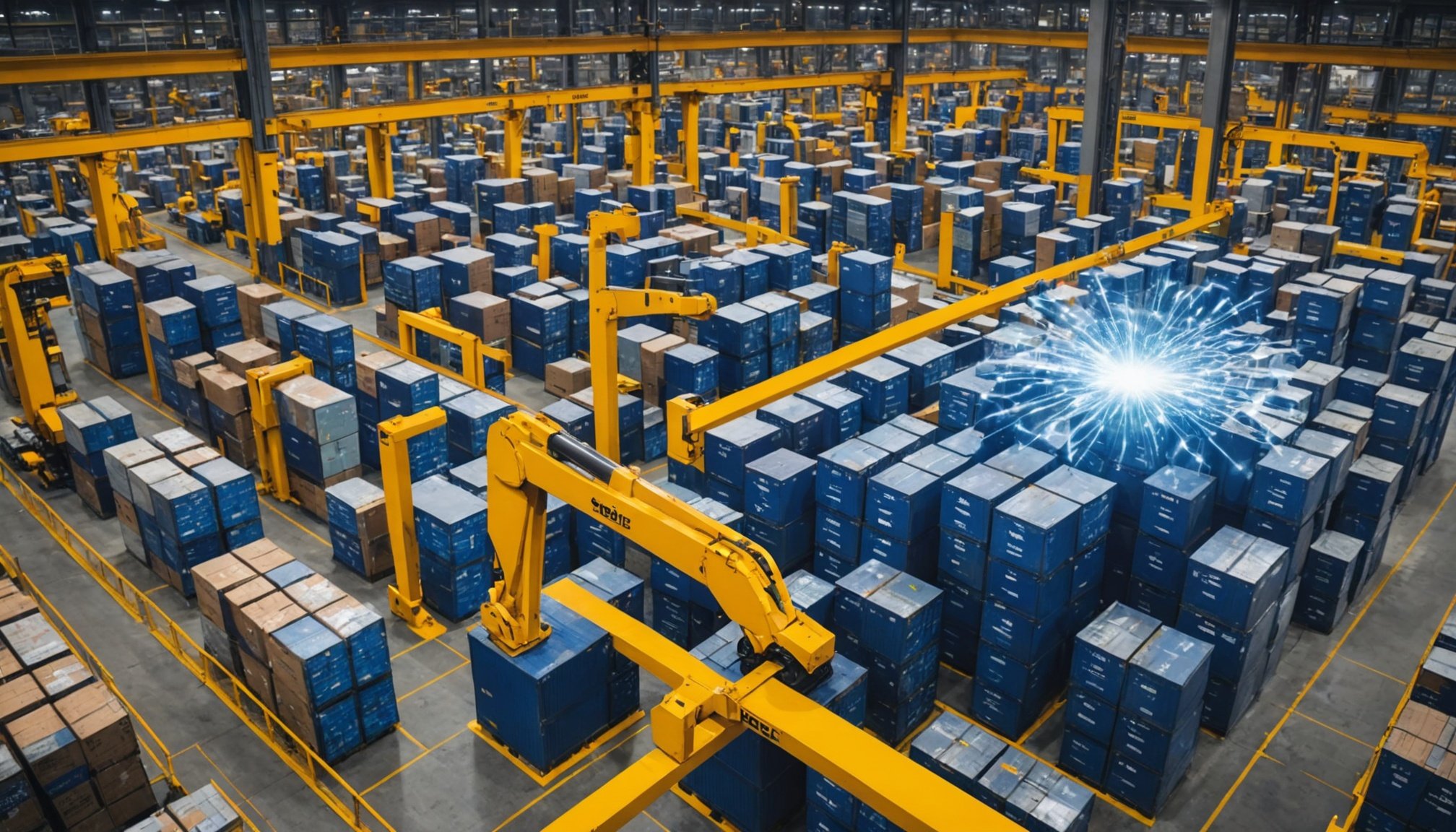Overview of AI in Supply Chain Management
AI in supply chain management is increasingly significant, revolutionising how businesses handle logistics, inventory, and customer demands. At its core, AI encompasses technologies that mimic human intelligence, optimising decision-making and enhancing processes. The primary operational efficiency benefits of integrating AI include reduced costs and improved delivery times, setting companies apart in a competitive market.
Current trends in AI utilisation show a surge in adoption across various industries. Key technologies like machine learning, IoT, and robotics are instrumental in transforming supply chains. These advancements allow for real-time data tracking, predictive analytics, and automated operations, streamlining processes from procurement to distribution.
Also to discover : 10 video production agencies that will transform your brand
Despite these advancements, traditional supply chains face challenges, such as rigidity and inefficiencies that make adaptation necessary. Technology integration is essential to overcome issues of redundancy and manage increased data scales effectively. Companies transitioning to AI-focused supply chains witness an unprecedented rise in adaptability and customer satisfaction.
The benefits of AI in supply chain management are clear: from transforming operational landscapes to redefining customer experiences, its integration spells innovation and progress. As AI continues to evolve, so too will the opportunities it presents for supply chain leaders ready to embrace the future.
Also read : Revolutionizing Pharmaceutical Manufacturing: Harnessing AI to Optimize and Elevate Validation Processes
Enhancing Operational Efficiency through AI
Operational efficiency within supply chains is experiencing a transformation through the deployment of AI solutions. Key technologies such as machine learning, automation, and the Internet of Things (IoT) are pivotal in driving these improvements. Machine learning algorithms harness vast datasets to predict demand and optimise inventory levels. Automation enables more efficient processes by reducing the need for human intervention, thereby lowering costs and increasing productivity.
IoT allows for the seamless integration of physical and digital supply chain elements, offering real-time data flow and enhanced tracking capabilities. Businesses across sectors are noting substantial productivity gains, particularly in industries like retail, where AI has streamlined stock replenishment and improved customer service through predictive analytics.
AI algorithms and data analytics significantly influence decision-making in supply chains by providing actionable insights. They allow for the anticipation of potential disruptions and facilitate contingency planning, ensuring uninterrupted operations.
As companies continue to embrace these technologies, they stand to gain not just in terms of reduced costs but also in enhanced customer satisfaction and flexibility. The pathway to achieving higher operational efficiency is continuously paved by these innovative AI applications, which redefine how supply chains operate today.
Case Studies of Successful AI Implementation
Exploring AI success stories provides valuable insights into operational improvements across industries. Let’s delve into specific cases highlighting quantifiable operational improvements.
Case Study 1: Retail Sector
A retail giant harnessed AI to enhance its inventory management by integrating machine learning algorithms. These algorithms accurately forecasted customer preferences, reducing overstock and understock issues. This shift led to a significant decrease in storage costs and improved sales by ensuring popular products were readily available. The company’s emphasis on AI solutions also improved customer satisfaction, offering more personalised shopping experiences.
Case Study 2: Manufacturing Industry
In the manufacturing sector, a leading firm adopted AI-driven automation to refine production processes. The implementation of robotics and IoT technologies increased productivity gains by streamlining operations and reducing human error. This transition not only boosted operational efficiency but also enhanced product quality, solidifying the company’s competitive edge.
Case Study 3: Logistics and Distribution
In logistics, a prominent distribution company embraced AI algorithms to optimise route planning. Real-time data analytics enabled more efficient fuel consumption and timely deliveries. Quantifiable benefits included a marked rise in delivery speed and decreased carbon footprint, underpinning the company’s commitment to sustainable practices.
These case studies exemplify how AI integration can yield notable operational gains across varied sectors.
Statistics on AI Impact in Supply Chains
The influence of AI impact on supply chains has been profound, as evidenced by recent efficiency statistics. Surveys indicate that companies leveraging AI technologies have reported up to a 40% improvement in operational efficiency, far surpassing traditional supply chain methods. These enhanced capabilities are often attributed to AI’s ability to provide predictive analytics, enabling better decision-making and planning.
A comparative analysis highlights the stark difference in performance: businesses adopting AI experience approximately 25% faster delivery times and 30% reduction in operational costs compared to their non-AI counterparts. These metrics underscore AI’s capacity to optimise processes from procurement to logistics management.
Furthermore, projections suggest that by 2030, AI integration is likely to boost overall supply chain productivity gains by another 15-20%, promising ongoing enhancements. This potential growth is contingent upon businesses’ willingness to embrace AI advancements and address associated challenges like data governance.
In light of these findings, the AI-driven transformation of supply chains represents not only an opportunity for immediate improvements but also a strategic advantage toward sustaining long-term success and competitiveness within the industry.
Expert Opinions on the Future of AI in Supply Chain Management
The future of AI in supply chain management excites many industry experts. Prominent figures predict that AI evolution will continue shaping supply chains, facilitating more flexible and responsive operations. As AI continues to mature, several potential developments are poised to revolutionise supply chains. These include enhanced predictive analytics for demand forecasting and technology integration that allows for seamless communication across digitally connected devices.
Leaders in logistics emphasise how emergent technologies such as blockchain could complement AI, bolstering transparency and traceability. This amalgamation is expected to reduce fraud and errors, thus increasing trust in global supply networks.
However, with progress come challenges. Regulatory hurdles related to data privacy and security need careful consideration as AI adoption grows. Experts advise that businesses should remain proactive in navigating these challenges, advocating for policy frameworks conducive to innovation.
Despite these challenges, the consensus is overwhelmingly positive. AI adoption is anticipated to become a cornerstone strategy for businesses aiming for operational excellence and sustainability. For organizations, this means staying abreast of technological advances and being prepared for the accompanying shifts in industry standards. Industry leaders urge proactive engagement with these trends to maintain competitiveness in the evolving marketplace.
Strategies for Implementing AI in Supply Chains
Implementing AI adoption in supply chains demands a strategic approach grounded in a comprehensive understanding of company readiness. Start by conducting a thorough audit of current systems to evaluate technology infrastructure and data quality. This lays the groundwork for effective AI integration.
Prioritise implementation strategies that align with business goals and operational needs. Identifying specific supply chain challenges AI can address, such as inventory management or route optimisation, allows for targeted solutions. Collaboration between IT and logistics departments is crucial to ensure smooth integration and function of AI-powered applications.
Successful AI adoption also hinges on fostering a culture of innovation. Companies must encourage openness to change, which involves continuous training programmes to upskill employees. This cultural shift supports the seamless transition to AI-driven processes and enhances business strategy.
Consider the importance of AI integration with existing technologies for seamless data flow and process automation. Investing in compatible AI solutions maximises benefits and operational effectiveness. Lastly, engage with expert insights to navigate potential regulatory challenges and ensure compliance, paving the way for sustainable AI-driven growth. By employing these strategies, businesses can unlock the full potential of AI in supply chains.











